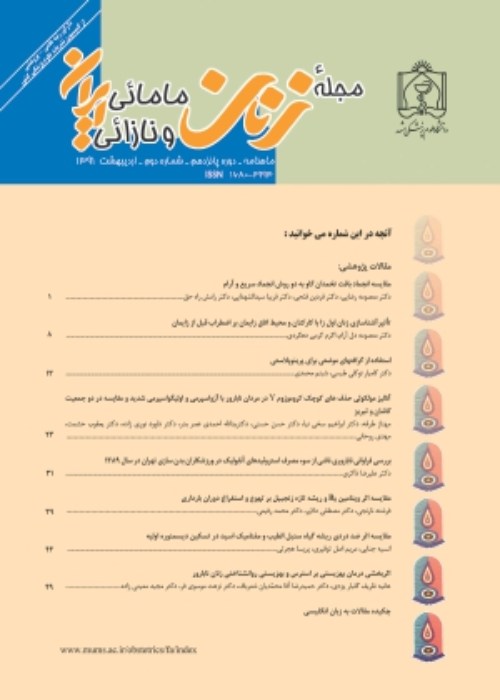Explaining the experiences and perceptions of gynecologists and midwives about virginity examination and it's outcomes: A qualitative Study
Author(s):
Abstract:
Introduction
Virginity examination is known as a custom and norm in some countries including Iran. The main aims for virginity examination in different cultures are including assessment of abstinence, delay for sexual relationship until marriage, prevention of AIDS and other sexually transmitted diseases, and keeping honor of family by defending of girls’ virginity. Because of different views in relation to virginity examination and surgery procedures to repair it by medical team and reproductive health service providers, reviewing their role and tasks seems to be necessary. This qualitative study was performed with aim to explain the gynecologists’ and midwives’ perceptions and experiences towards virginity examination and its outcomes. Methods
This qualitative study was performed using content analysis approach. Fifteen participants including 7 gynecologists and 8 midwives were qualified for the study that were selected at first by purposeful sampling method and then by snowball sampling method. They were interviewed by in-depth individual interview. Primary question guide was used to collect data. All interviews were recorded and typed and were analyzed by content analysis approach. Results
The analysis of qualitative data led to the presentation of 3 categories "examination’s identity", "examination’s requirements", and "prevention of negative outcomes of examination". The category of “examination identity” had three sub-categories including “the reasons for virginity examination”, “prognostic value of the examination”, and “the outcomes of examination”. The category of “examination’s requirement” had the sub-categories of “the necessity for planning and monitoring of the examination process and the consequences of negative results”, “training, support and safety of medical and midwifery system”, and “reproductive health rights and ethics”. In third category of “prevention of negative outcomes of examination”, there were two subgroups of “the strategies for community empowerment” and “the strategies for prevention from the outcomes of the negative results”. Conclusion
The virginity examination is not related to medical intervention such as prevention, treatment or rehabilitation. It cannot prove the lack of sexual activity and has undesired consequences. Health system promotion in relation to the quality of this examination and education-based community empowerment are two basic approaches to maintain the reproductive health rights.Keywords:
Language:
Persian
Published:
Iranina Journal of Obstetrics Gynecology and Infertility, Volume:18 Issue: 173, 2015
Pages:
1 to 22
magiran.com/p1492729
دانلود و مطالعه متن این مقاله با یکی از روشهای زیر امکان پذیر است:
اشتراک شخصی
با عضویت و پرداخت آنلاین حق اشتراک یکساله به مبلغ 1,390,000ريال میتوانید 70 عنوان مطلب دانلود کنید!
اشتراک سازمانی
به کتابخانه دانشگاه یا محل کار خود پیشنهاد کنید تا اشتراک سازمانی این پایگاه را برای دسترسی نامحدود همه کاربران به متن مطالب تهیه نمایند!
توجه!
- حق عضویت دریافتی صرف حمایت از نشریات عضو و نگهداری، تکمیل و توسعه مگیران میشود.
- پرداخت حق اشتراک و دانلود مقالات اجازه بازنشر آن در سایر رسانههای چاپی و دیجیتال را به کاربر نمیدهد.
دسترسی سراسری کاربران دانشگاه پیام نور!
اعضای هیئت علمی و دانشجویان دانشگاه پیام نور در سراسر کشور، در صورت ثبت نام با ایمیل دانشگاهی، تا پایان فروردین ماه 1403 به مقالات سایت دسترسی خواهند داشت!
In order to view content subscription is required
Personal subscription
Subscribe magiran.com for 70 € euros via PayPal and download 70 articles during a year.
Organization subscription
Please contact us to subscribe your university or library for unlimited access!


